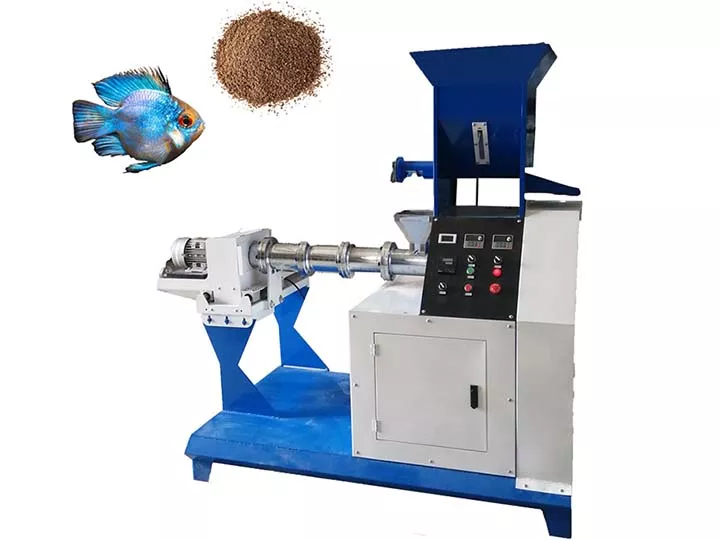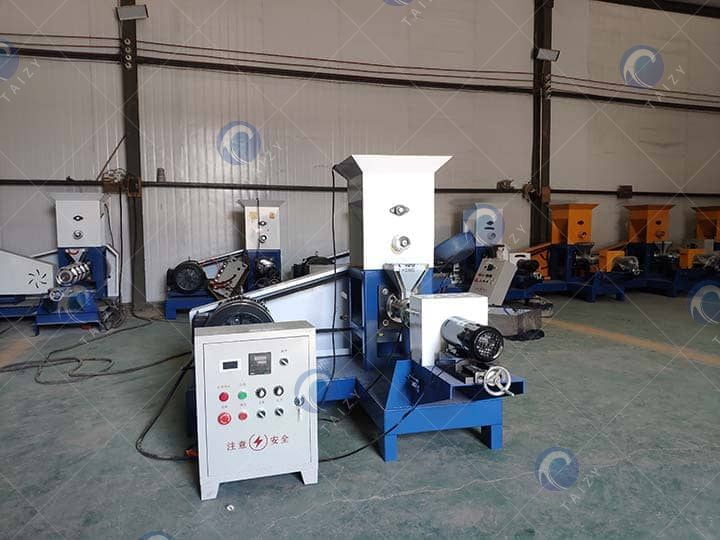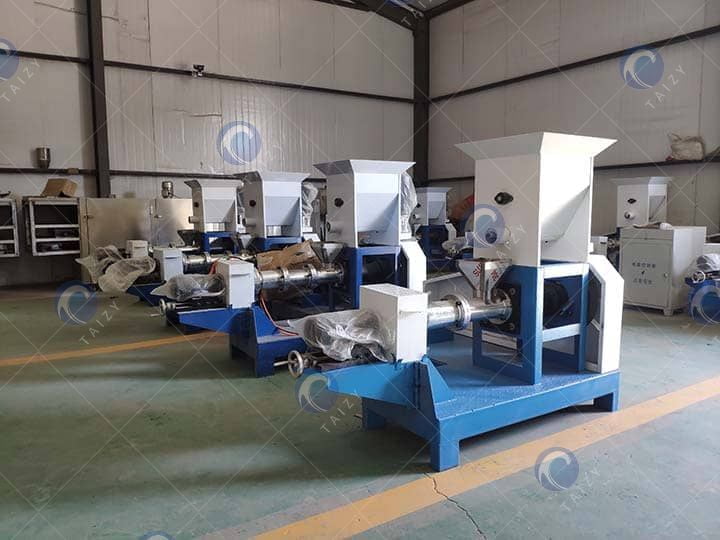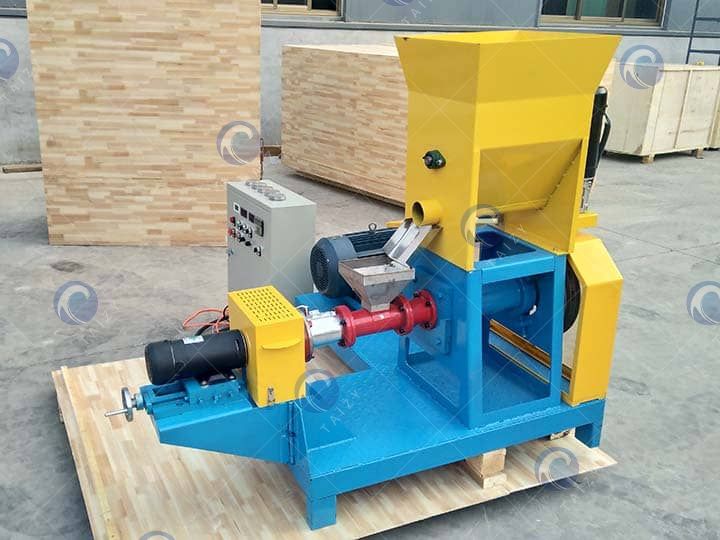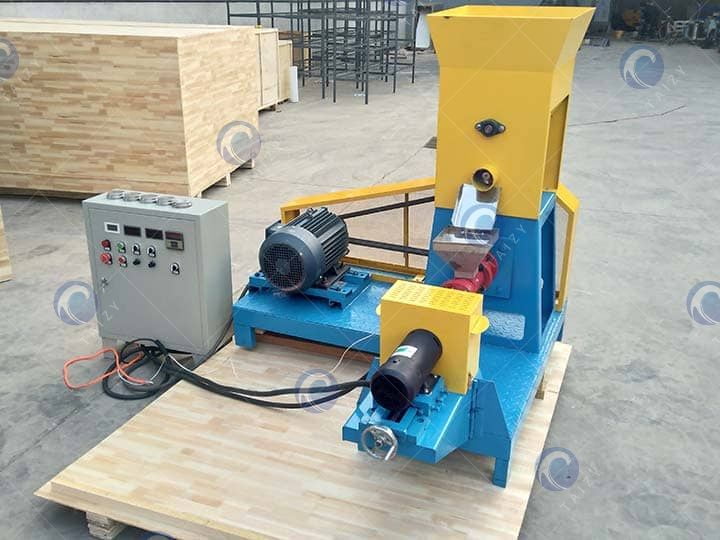เครื่องอัดเม็ดอาหารปลา | เครื่องอัดรีดอาหารปลาป่อง
| แบบอย่าง | DGP70 |
| ความจุ(กก./ชม.) | 180-250 |
| กำลังป้อน (กิโลวัตต์) | 18.5 |
| กำลังตัด (กิโลวัตต์) | 0.4 |
| ขนาด(มิลลิเมตร) | 1600*1400*1450 |
เครื่องอัดเม็ดอาหารปลาที่ สามารถผลิตเม็ดอาหารคุณภาพสูงและมีคุณค่าทางโภชนาการอย่างมีประสิทธิภาพ โดยผสมส่วนผสมสำคัญเช่น ปลาป่น ข้าวโพดบด และแป้งในอัตราส่วนสมดุล เหมาะสำหรับเตรียมอาหารสำหรับสัตว์หลากหลาย รวมถึงสัตว์น้ำ เช่น ปลา และสัตว์เลี้ยงบนบก เช่น สุนัขและแมว
ออกแบบมาเพื่อความหลากหลาย เครื่องนี้สามารถใช้พลังงานจากมอเตอร์ไฟฟ้าหรือเครื่องยนต์ดีเซล เพื่อให้การทำงานเป็นไปอย่างต่อเนื่องในสภาพแวดล้อมการทำงานที่แตกต่างกัน ด้วยความสามารถในการผลิตตั้งแต่40 ถึง 450 กก./ชม.สามารถสร้างเม็ดในขนาดต่าง ๆ ตั้งแต่1 มม. ถึง 13 มม.นอกจากนี้ยังมีตัวเลือกการปรับแต่งเพื่อให้ตรงกับความต้องการเฉพาะด้านขนาด รูปร่าง และสูตรของเม็ด
ขายเครื่องอัดเม็ดอาหารปลา
เรามีเครื่องอัดเม็ดอาหารปลาอัตโนมัติที่หลากหลาย ซึ่งเหมาะสำหรับการแปรรูปวัสดุ เช่น เมล็ดพืช หลอด หญ้า และแกลบให้เป็นเม็ดปลาลอยน้ำ กลไกการอัดรีดและการถูช่วยให้มั่นใจได้ว่าเม็ดจะสุกเต็มที่เพื่อให้ได้สารอาหารที่ดีขึ้น
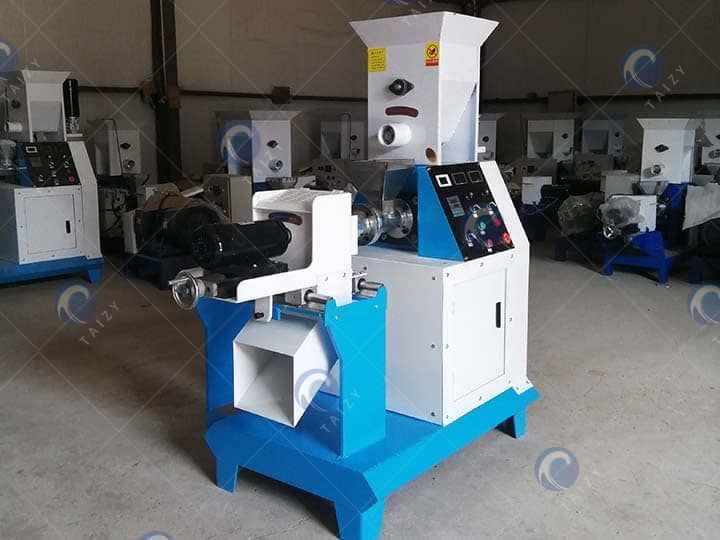
คุณสมบัติที่สำคัญ
- ตัวเลือกพลังงานที่ยืดหยุ่น- เครื่องจักรสามารถทำงานได้กับมอเตอร์ไฟฟ้าหรือเครื่องยนต์ดีเซลเพื่อให้เหมาะกับสภาพแวดล้อมที่แตกต่างกัน
- ช่วงขนาดเม็ด- 1-13 มม. พร้อมแม่พิมพ์มาตรฐานหกแบบต่อเครื่องฟรี
- แม่พิมพ์ที่ปรับแต่งได้- มีรูปร่างและขนาดที่ปรับแต่งตามความต้องการของลูกค้าโดยเฉพาะ
- รุ่นยอดนิยม- DGP40, DGP60, DGP70, DGP80 และ DGP100 พร้อมด้วยรุ่นขนาดใหญ่สำหรับความต้องการการผลิตที่สูงขึ้น
เคล็ดลับประสิทธิภาพ
- วัตถุดิบก่อนการประมวลผลโดยใช้ก เครื่องบดเมล็ดพืช หรือ เครื่องตัดแกลบ สามารถปรับปรุงประสิทธิภาพ ประหยัดเวลาและพลังงานในระหว่างการผลิตเม็ด
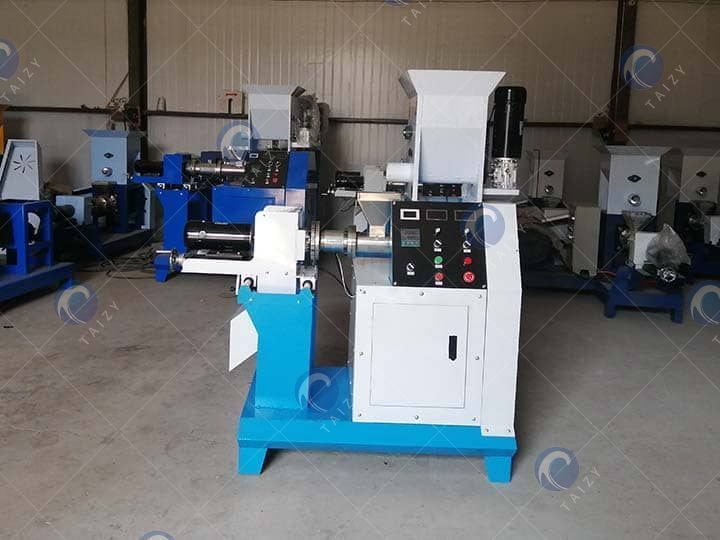
เครื่องจักรอเนกประสงค์นี้เหมาะอย่างยิ่งสำหรับฟาร์มเพาะเลี้ยงสัตว์น้ำหรือผู้ผลิตอาหารสัตว์เลี้ยงที่ต้องการอาหารสัตว์คุณภาพสูงสม่ำเสมอ
ข้อกำหนดโดยละเอียดของเครื่องอัดเม็ดอาหารปลา
| แบบอย่าง | ความจุ(กก./ชม.) | กำลังป้อน (กิโลวัตต์) | กำลังตัด (กิโลวัตต์) | เส้นผ่านศูนย์กลางของสกรู (มม.) | ขนาด(มิลลิเมตร) |
| DGP40 | 40-50 | 5.5-7.5 | 0.4 | Φ40 | 1260*860*1250 |
| DGP60 | 150 | 15 | 0.4 | Φ60 | 1450*950*1430 |
| DGP70 | 180-250 | 18.5 | 0.4 | Φ70 | 1600*1400*1450 |
| DGP80 | 300-350 | 22-27 | 0.4 | Φ80 | 1850*1470*1500 |
| DGP100 | 400-450 | 37 | 1.1 | Φ100 | 2000*1600*1600 |
เครื่องอัดเม็ดอาหารปลาใช้งานอย่างไร?
เครื่องอัดเม็ดอาหารปลาถูกออกแบบให้ใช้งานง่าย ด้วยกระบวนการที่ตรงไปตรงมาเพื่อความมีประสิทธิภาพ อย่างไรก็ตาม การอุ่นเครื่องก่อนเริ่มการผลิตเป็นสิ่งสำคัญเพื่อให้ได้ประสิทธิภาพสูงสุดและหลีกเลี่ยงปัญหาในระหว่างการทำงาน ต่อไปนี้เป็นภาพรวมของกระบวนการของเครื่อง รวมถึงขั้นตอนการอุ่นเครื่อง
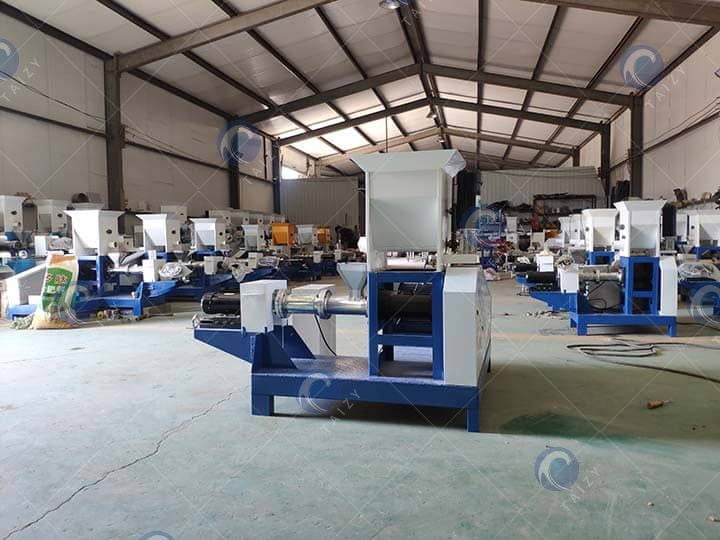
- อุ่นเครื่องเครื่องจักร โดยการตรวจสอบให้ถังบรรจุว่างเปล่า, ถอดกล่องปล่อย, และเริ่มมอเตอร์หลักก่อนมอเตอร์ให้อาหาร
- ให้อาหารอย่างค่อยเป็นค่อยไป โดยการเพิ่มวัสดุอย่างช้าๆ และเพิ่มปริมาณจนกว่าจะถึงระดับที่เสถียรและต้องการ
- ตรวจสอบอุณหภูมิ และปล่อยให้มันขึ้นระหว่าง 50°C และ 80°C ใกล้กับช่องปล่อย
- หยุดให้อาหารชั่วคราว เมื่ออุณหภูมิเพิ่มถึงเป้าหมายแล้ว ปล่อยให้วัสดุที่เหลือออกจากห้องพัฟฟิ่ง
- เริ่มการผลิต โดยการรักษาการไหลของวัสดุให้คงที่และสม่ำเสมอ เพื่อให้ได้เม็ดคุณภาพสูงและสม่ำเสมอ
- เสร็จสิ้นกระบวนการ โดยการยืนยันว่าห้องเต็มไปด้วยวัสดุอย่างสมบูรณ์ก่อนปิดเครื่องเพื่อป้องกันการอุดตันและเพื่อให้ทำงานได้อย่างเต็มประสิทธิภาพ
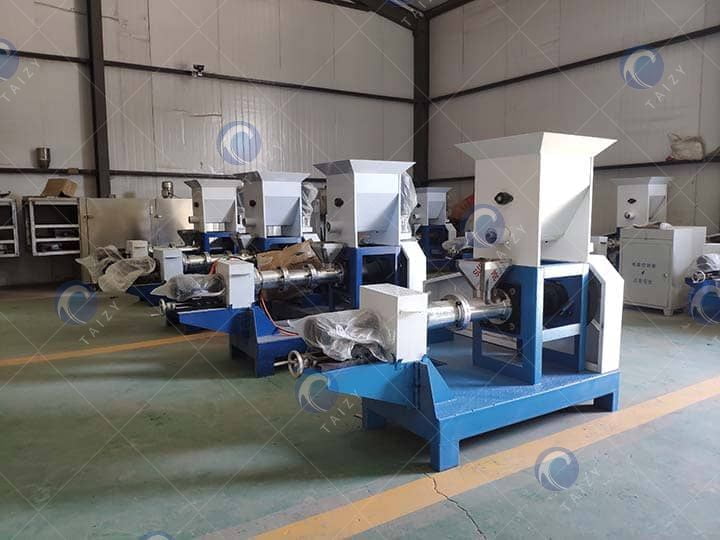
การปฏิบัติตามขั้นตอนเหล่านี้ช่วยให้มั่นใจได้ถึงการทำงานที่ราบรื่นและคุณภาพเม็ดสม่ำเสมอ ทำให้เครื่องจักรเชื่อถือได้สำหรับการผลิตอาหารปลาและอาหารสัตว์เลี้ยง
ข้อดีของเครื่องอัดรีดอาหารปลา
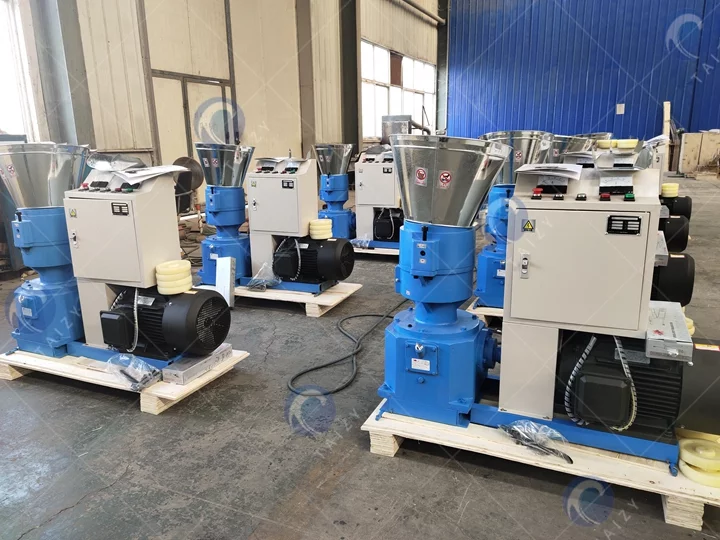
- ความสามารถปรับตัวสูง: มีให้เลือกหลายขนาดเพื่อให้เหมาะสมกับความต้องการในการผลิตทั้งขนาดเล็กและขนาดใหญ่
- การใช้งานกว้าง: ผลิตอาหารสัตว์น้ำ อาหารสัตว์เลี้ยง และอาหารพิเศษโดยใช้วัตถุดิบเช่นถั่วเหลือง ข้าวโพด และอาหารเมล็ดฝ้าย
- การให้อาหารแบบยืดหยุ่น: ติดตั้งเครื่องให้อาหารอัตโนมัติความเร็วปรับได้เพื่อการจัดการวัสดุที่มีประสิทธิภาพ
- ดีไซน์กะทัดรัด: มีขนาดกะทัดรัด เสียงต่ำ และใช้งานง่าย ดูแลรักษาง่าย
- การรักษาความชื้น: รักษาระดับความชื้นในเม็ดให้เหมาะสมเพื่อป้องกันการเน่าเสียในระหว่างการเก็บรักษา
- ผลกำไรที่สูงขึ้น: เสริมสร้างการเจริญเติบโตของสัตว์และประสิทธิภาพการให้อาหาร เพิ่มผลตอบแทนโดยรวม
- ย่อยง่ายขึ้น: สร้างเม็ดแข็งแรง เรียบเนียน ช่วยเพิ่มการดูดซึมสารอาหาร
- การป้องกันสุขภาพ: ฆ่าเชื้อปรสิตและเชื้อโรคระหว่างการขึ้นรูป ส่งเสริมสุขภาพสัตว์
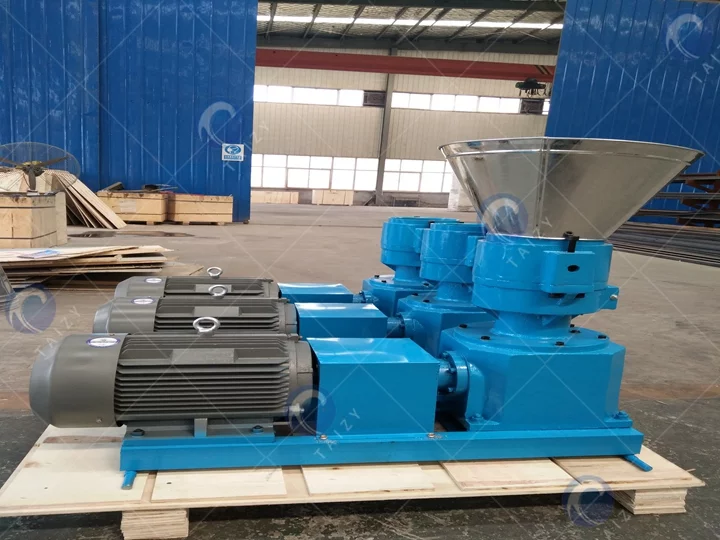
การใช้งานของเครื่องอัดเม็ดอาหารปลา
เครื่องอัดรีดอาหารปลาใช้กันอย่างแพร่หลายในอุตสาหกรรมเพาะเลี้ยงสัตว์น้ำและอาหารสัตว์ ผลิตอาหารเม็ดแบบลอยและจมสำหรับปลา กุ้ง และปู เพื่อเพิ่มประสิทธิภาพการให้อาหาร
ประกอบกิจการผลิตอาหารสัตว์เลี้ยง ผลิตเม็ดสำหรับสุนัข แมว และปลาสวยงาม นอกจากนี้ เครื่องจักรยังแปรรูปวัตถุดิบ เช่น กากถั่วเหลืองและข้าวโพด ซึ่งช่วยให้การดูดซึมสารอาหารดีขึ้น สามารถผลิตอาหารเฉพาะสำหรับสัตว์ เช่น เป็ดและสุนัขจิ้งจอก
ในระหว่างการดำเนินการ ระบบจะล้างพิษส่วนผสมบางอย่างและฆ่าเชื้ออาหาร เพื่อให้มั่นใจในการบริโภคอย่างปลอดภัย ความอเนกประสงค์นี้ทำให้เครื่องอัดรีดจำเป็นสำหรับทั้งฟาร์มเพาะเลี้ยงสัตว์น้ำและผู้ผลิตอาหารสัตว์เลี้ยง
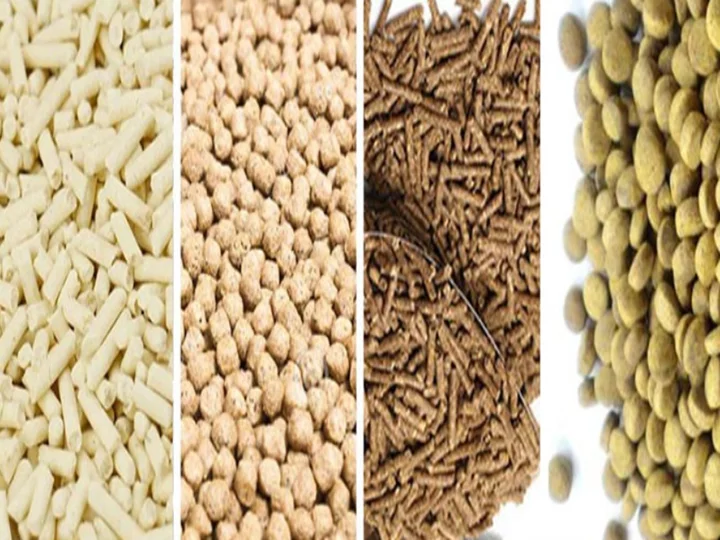
คำถามที่พบบ่อยเกี่ยวกับเครื่องอัดเม็ดอาหารปลา
1. เครื่องอัตโนมัติช่วยเพิ่มประสิทธิภาพการผลิตในเครื่องอัดเม็ดอาหารปลาอย่างไร?
เครื่องให้อาหารอัตโนมัติช่วยให้การไหลของวัตถุดิบเป็นไปอย่างสม่ำเสมอ ลดการแทรกแซงด้วยมือและความผันผวนในการให้อาหาร ซึ่งช่วยเสถียรภาพคุณภาพเม็ดและเพิ่มประสิทธิภาพโดยรวม
2. ทำไมการรักษาความชื้นของเม็ดให้เหมาะสมจึงสำคัญต่อการเก็บรักษาและคุณภาพอาหาร?
ความชื้นที่สมดุลช่วยป้องกันไม่ให้เม็ดแห้งเกินไปหรือเป็นเชื้อรา ยืดอายุการเก็บรักษา พร้อมรักษาคุณค่าทางโภชนาการและเนื้อสัมผัส
3. การอัดขึ้นรูปช่วยกำจัดปรสิตและเชื้อโรคในกระบวนการผลิตอาหารอย่างไร?
ระหว่างการอัดขึ้นรูป อุณหภูมิและแรงดันสูงจะทำลายจุลินทรีย์ที่เป็นอันตรายอย่างมีประสิทธิภาพ เพื่อให้แน่ใจว่าอาหารปลอดเชื้อและปลอดภัยสำหรับการบริโภคของสัตว์
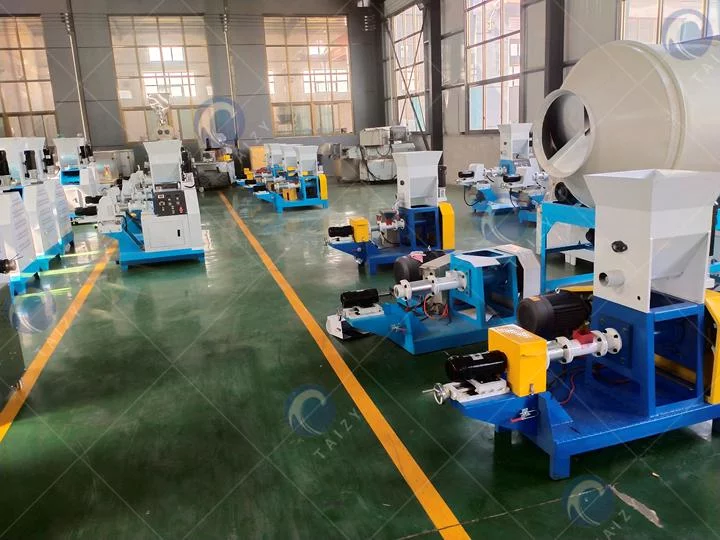
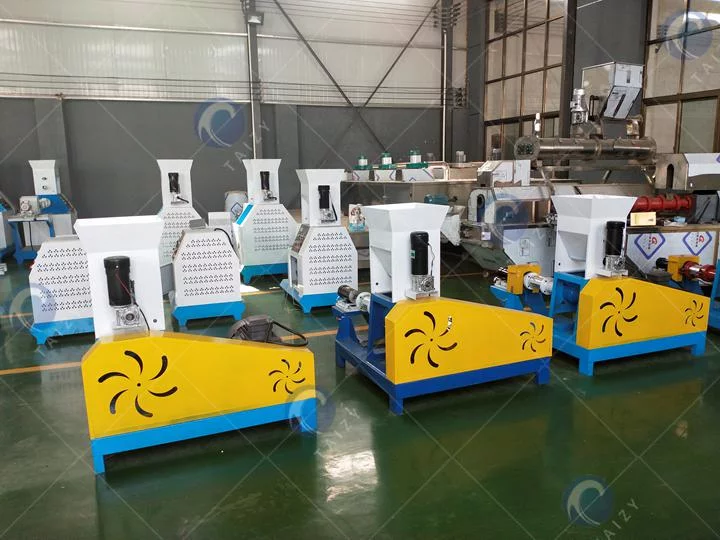
แนวทางความปลอดภัยในการใช้งานเครื่องอัดเม็ดอาหารปลา
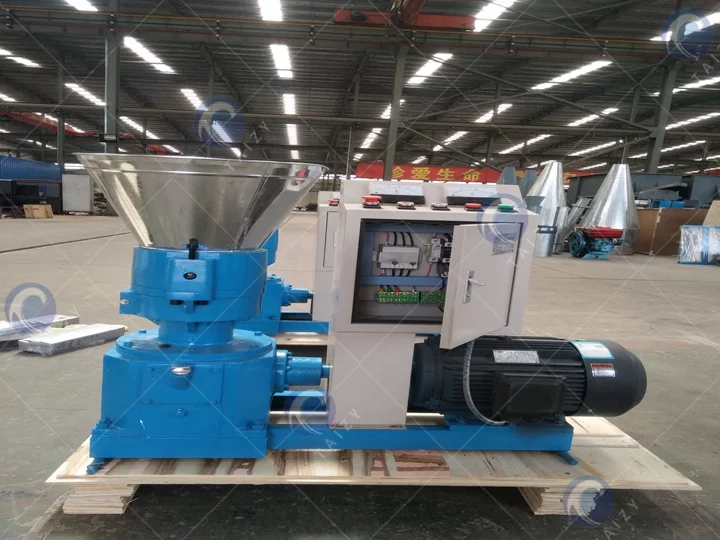
- หลีกเลี่ยงอันตรายจากทางออก ผู้ปฏิบัติงานจะต้องไม่ยืนใกล้ทางออกเพื่อป้องกันอุบัติเหตุจากการดีดวัสดุออก
- สวมอุปกรณ์ป้องกัน ใช้ถุงมือทนความร้อนเพื่อป้องกันการไหม้เสมอ
- เคลียร์เครื่อง. ตรวจสอบให้แน่ใจว่าไม่มีเครื่องมือหรือวัตถุแปลกปลอมอยู่ข้างในก่อนสตาร์ท
- ติดตามการดำเนินงาน ตรวจสอบเครื่องอย่างสม่ำเสมอเพื่อหาสิ่งผิดปกติและปรับเปลี่ยนทันที
- จัดการกล่องจำหน่ายด้วยความระมัดระวัง ปล่อยแรงดันภายในออกด้วยความระมัดระวังก่อนถอดออก เพื่อป้องกันการไล่วัสดุโดยไม่คาดคิด
ติดต่อเรา
หากคุณต้องการประสบความสำเร็จมากขึ้นในด้านการเพาะเลี้ยงสัตว์น้ำ เราขอเชิญคุณสำรวจความเป็นไปได้ไม่จำกัดที่เครื่องอัดเม็ดอาหารปลา สามารถนำเสนอได้
ติดต่อเราตอนนี้!
